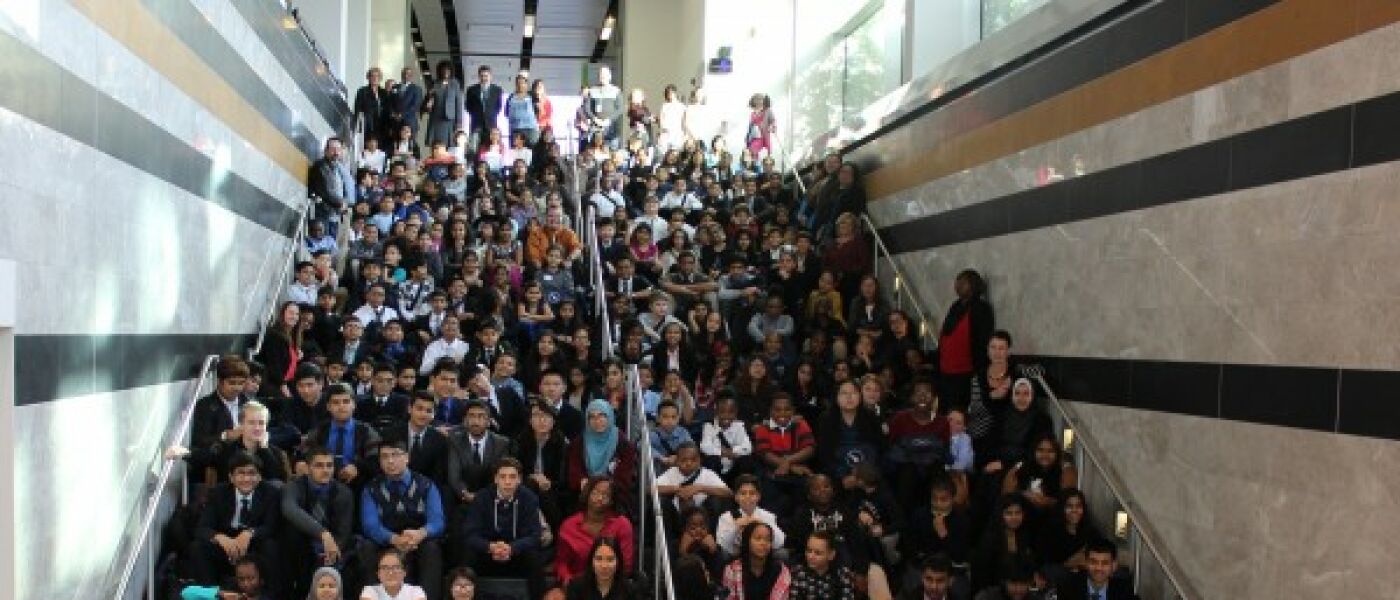Future Space Scientists Land at Liberty Science Center
Under Liberty Science Center’s guidance, students from Jersey City Public Schools took one giant leap toward seeing their science experiments conducted in space. They entered the Student Spaceflight Experiments Program (SSEP). SSEP enhances STEM* education initiatives as students design and propose experiments to be conducted in a microgravity environment aboard the International Space Station (ISS). The program was launched in June 2010 by the National Center for Earth and Space Science Education (NCESSE) in strategic partnership with NanoRacks, LLC. The Jersey City schools participating this year: P.S. 8, P.S. 11, P.S. 14, P.S. 16, P.S. 20, P.S. 25, P.S. 27, Dickinson High School, and McNair Academic High School.
Round 1 of judging for Mission 9 was completed on Monday, November 9, at LSC with the help of 21 participating judges from Jersey City Public School District, Stevens Institute of Technology, Columbia University, New Jersey See Grant Consortium, Montclair High School, and LSC. More than 62 proposals were judged, and three proposals were selected to continue on to Round 2.
The selected proposals are:
- Will Calcium Carbonate Help Slow Down the Process of Bone Decaying in Microgravity?
P.S. 25: Nicolaus Copernicus School (5th grade)
Project description: Astronauts lose approximately 14% of bone mass in a 6-month journey. This group will be using osteoblasts cells and blood cells to determine a better way to reduce bone loss in astronauts.
- Effects of Microgravity on Neuronal Morphology
McNair Academic High School
Project description: In this experiment, analyses about the morphological changes that are experienced in neuronal cells’ synapses in microgravity will be conducted. Data about neurons from a microgravity environment will be compared with those in a normal gravity setting in order to qualitatively and quantitatively form conjectures about the changes in the mental abilities of astronauts (such as memory performance, information recollection, etc).
- Effects of Microgravity on Muscle Tissue Regeneration with TRF-150
McNair Academic High School
Project description: The aim of the experiment, is to analyze the potential of the drug TRF-150 to regenerate tissue faster when exposed to a microgravity environment. This experiment will help determine if a microgravity environment aids in the regeneration of organic tissue. If the experiment implies the increase of the regenerative properties of TRF-150 then simulated microgravity environment can be implemented to help patients enduring a muscle injury.
The three selected experiments will be revised, then submitted to NCESSE by Monday, November 16. NCESSE will select one proposal that will be sent and conducted aboard the ISS. Crew members aboard the ISS will follow the procedures submitted by the student group and return the experiment in late May.
Speakers at Monday’s judging session included Dr. Marcia Lyles, Superintendent of Jersey City School District; Aldo Sanchez-Abreu, Associate Superintendent of Jersey City School District; Jason Bing, Chief Academic Officer of Jersey City School District; Patrick McQuillan, Vice President of STEM Education at Liberty Science Center; Ruben Rosario, LSC’s Director of STEM Enrichment; and Deepa Shah, LSC’s Specialized Programs Coordinator-STEM Enrichment.
Congratulations to all participating students on their outstanding work! We wish the three selected groups the very best as they continue to refine their proposals.
STEM blog by Andrew Bjorge, STEM Enrichment Specialist, and Deepa Shah, Specialized Programs Coordinator. Andrew and Deepa facilitate lab-based programs in the Jennifer A. Chalsty Center for Science Learning and Teaching
*STEM = science, technology, engineering, and math




